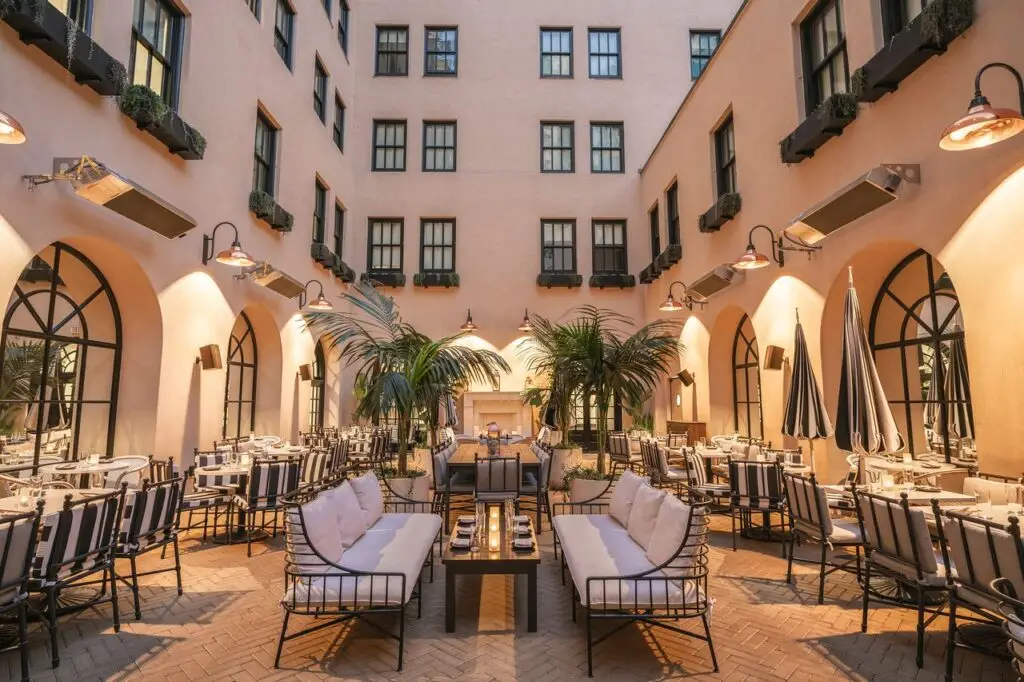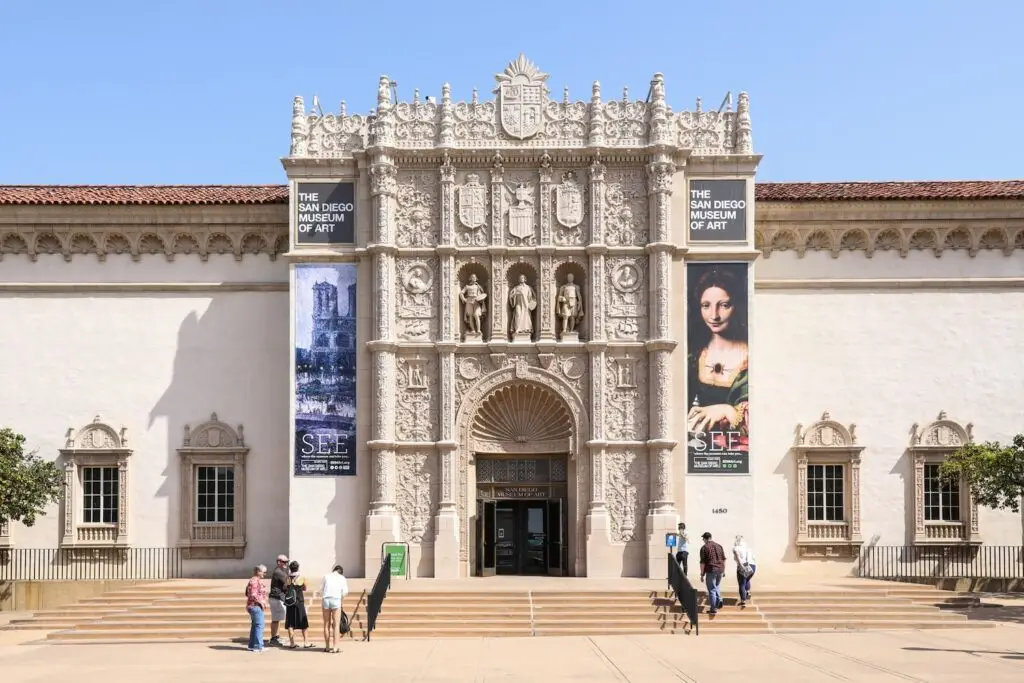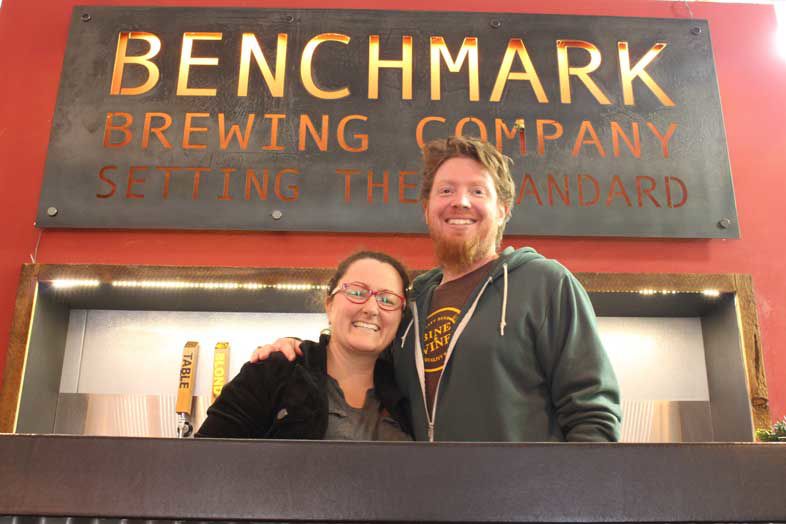Right around the holidays, we all get a healthy dose of It’s a Wonderful Life–type tales that brighten our days and offer renewed hope for humanity. We’re a few weeks too late for that now, but I’m going to give you one anyway. Better late than never.
In truth, this is a feel-good story that can be told at any time of year, but it’s particularly poignant now—not only because we’ve just finished the holiday season, but also because we’re at a point in the evolution of the San Diego beer industry where numerous breweries of all sizes and stripes are struggling to survive. The struggles, it should be pointed out, often have nothing to do with the quality of the beer or the character of the people; they typically come about when the business side of things goes sideways for one unanticipated reason or another.
The recent travails of Grantville’s Benchmark Brewing Company are a perfect example of bad things happening to good people (who make great beer). For Benchmark’s co-owners, Matt and Rachael Akin, things started going seriously wrong during the first quarter of 2018, when their relatively new distribution agreement started to show signs of strain. For numerous reasons, the arrangement was not working and it was stressing Benchmark’s production capabilities in an unsustainable way. At the same time, Benchmark’s sales took a nosedive. “We thought it might be a month or two that sales would suffer initially,” Matt explains, “but we wound up going down about 66 percent in our revenue and it never came back up.” As those problems worsened, head brewer Matt suffered an injury that essentially laid him up for three months. Needless to say, this strained Benchmark’s production capabilities even more. Matt’s injury required him to be on pain meds and essentially took him out of the brewhouse. As Rachael puts it, losing Matt as the head brewer was the catalyst for Benchmark “losing sight of the big picture.”
“I was just trying to hold things together as best as I could,” Rachael recalls. “There literally were days where Matt sat down at the end of the brewhouse and told me what to do. We made beer that way a couple of times. It was horrifying.”
“I was pretty damn useless,” Matt adds. On top of all the frustration and heartache, having Matt out of commission felt to Rachael as if she had lost her “business partner and life partner in one fell swoop.”
By the fall, Rachael and Matt knew they needed to have an exit strategy ready once their yearlong distribution agreement expired—that’s when they decided Brown Bag Beverage distribution company was their answer. While they were transitioning, though, cash flow and sales continued to be a major problem. Even though they had a new distributor lined up, the myriad pressures and problems the brewery faced made Rachael and Matt—by the end of 2018—feel as if Benchmark could not go on. In December, Rachael posted on Facebook that Benchmark was seeking a buyer and did not have the resources to remain in their production facility in Grantville any longer. The news was met by the beer community with great surprise, concern, and a surprisingly swift determination to do something to help.
Within a week or so, about 20 local publicans and beer retailers organized themselves in an effort they named “Benchmarking Across San Diego,” which culminated on December 11, when all participating businesses featured multiple selections of Benchmark Beer. The organizing businesses included Tiger!Tiger!, Bar Pink, Panama 66, LaBella’s Pizza Garden, Beerfish, Toronado San Diego, Hamiltons Tavern, Urge American Gastropub, O’Brien’s Pub, Small Bar & Grill, Manhattan Bar, Blind Lady Ale House, Machete Beer House, The Elwood, The Regal Beagle, Rose Wine Pub, Garden Kitchen, Luigi’s Pizza Golden Hill, and Pizza Port Carlsbad.
Together, these accounts choreographed a major purchasing push and bought 41 kegs, an order that resulted in Benchmark’s single largest day of sales in its history. “It was totally amazing,” Rachael recalls. “We’ve never moved more IPA in one day. It was crazy town.”
“And I’ve never seen an IPA batch go that quickly,” Matt adds. “The Table Beer was gone before I even got to taste any of it!”
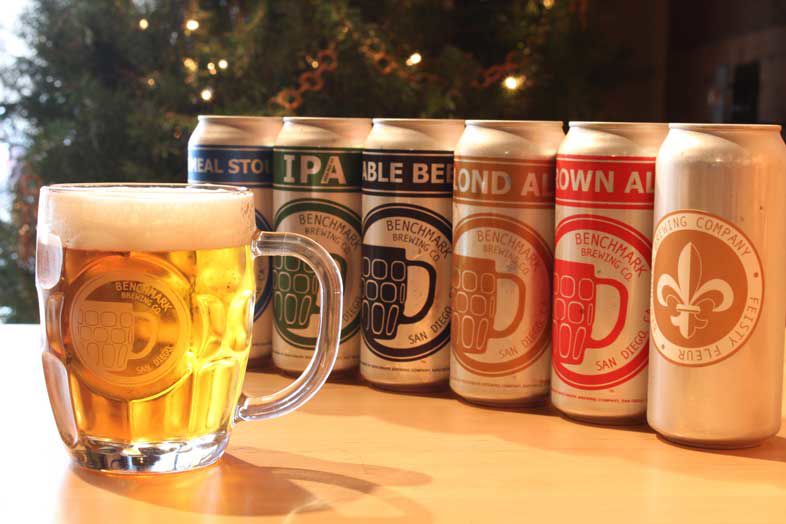
San Diego’s Beer Community Embraces Benchmark Brewing
Beer lovers can show their support for Benchmark by purchasing cans at numerous retail outlets around San Diego | Photo: Bruce Glassman
“From what I understand,” Rachael says, “Matt Cieslak [Manhattan Bar] and Karen Barnett [Small Bar] got together to figure out what they could do to help. They decided they’d pool all their fellow publicans and would get everybody to buy beer.”
Matt Akin adds that Matt Cieslak said to them, “None of us want to see you guys go away, so we’re just going to do what we can to show you the love and to try and spread the love.”
The big single-day order was from bars and restaurants, but lots of other people were also coming into the tasting room and buying cases of beer (including Pat and Val McIlhenney from Alpine Beer Co.) in order to do their part. Some regulars decided to visit the tasting room every single day to show their solidarity. “I still have to kind of hold back a tear,” Matt says, thinking about the expressions of support Benchmark saw from the community. “It was completely and totally overwhelming. And so emotional. And so amazing!”
“It was so cool to get the big giant hug from San Diego beer,” Rachael says.
The benefits of the big order were great, and it helped Benchmark in the short term, but it was not enough—nor could it ever be—to solve all of the company’s long-term problems. So now, as Matt and Rachael explain, the next step is finding additional capital. “We’re working with a handful of people to bring in some more investment that will get us over the rebuilding months,” Rachael explains. “We need to ramp up production, and it costs money to ramp up production.” The sheer timeframe needed to get beer from grain to glass means a brewery usually has to float costs for at least 60 days, if you consider that their accounts typically have 30 days to pay. That’s a long time to be out of pocket for tanks and tanks of beer.
The new distribution agreement with Brown Bag will be another key to Benchmark’s future success. Susie Baggs, who started Brown Bag, used to be a salesperson for Benchmark; Matt and Rachael are confident that Susie has a deep understanding of their company, their product, and how they operate.
According to Matt, support from the beer community will also continue indefinitely, taking on many forms. For example, he says he knows of a number of breweries that are organizing beer events for 2019 and are making sure Benchmark is included. “These are our competitors, making sure that we get out into the world to sell our beer,” Matt says. “It’s amazing.”
Beer fans and regular patrons will also, no doubt, show their support by continuing to visit Benchmark’s two tasting venues as well as local retail venues to purchase cans or growlers. Currently, cans can be purchased at tasting rooms in both Grantville and Bay Park, and are also on the shelves at Bottlecraft, Bine & Vine, some Whole Foods stores, Windmill Farms, Frazier Farms, Baron’s, and Jimbo’s.
Rachael and Matt are excited for the new apartment complex slated to open this spring across the street from them in Grantville, which will no doubt increase tasting room traffic, and they are working on a bunch of promising direct-to-consumer channels that could prove very successful for them as well. So the future looks positive. “There’s all kinds of good things coming for this year,” Matt says with a wide smile. “We just gotta push on through!”
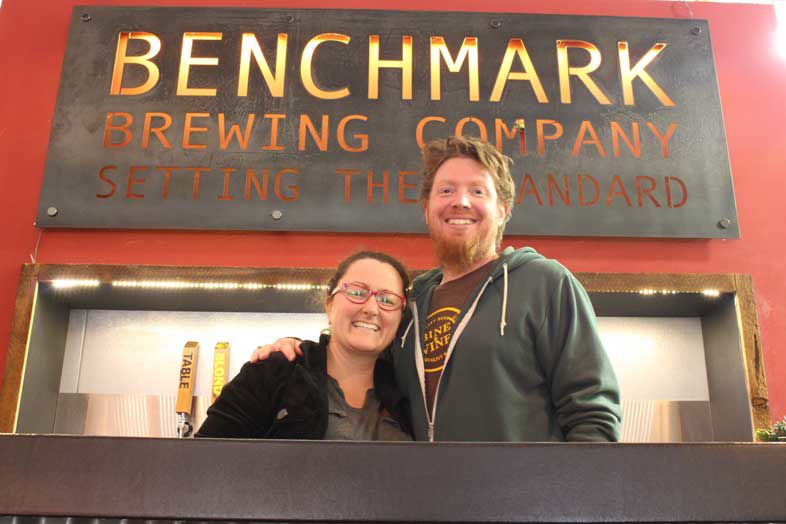
PARTNER CONTENT
Benchmark’s Rachael and Matt Akin got a “big giant hug from San Diego beer” in December | Photo: Bruce Glassman

